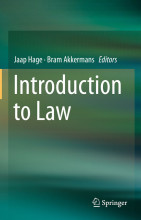Summary: Introduction To Law | 9783319069104 | Jaap Hage, et al
- This + 400k other summaries
- A unique study and practice tool
- Never study anything twice again
- Get the grades you hope for
- 100% sure, 100% understanding
Read the summary and the most important questions on Introduction to Law | 9783319069104 | Jaap Hage; Bram Akkermans
-
1 Sources of Law
This is a preview. There are 5 more flashcards available for chapter 1
Show more cards here -
What are the main characteristics of Law? (4)
- Rules --> how to behave/ definitiions/ competencies
- has collective Enforcement
- offers legal certainty
- applied consistently
-
What are the advantages of positive law over what is 'really right'?
- Positive law offers legal certainty, really right is questionnable
- Positive law therefore saves time and money + gives solution
- Positive law is enforced by authority and applied consinstently
- Positive law offers legal certainty, really right is questionnable
-
What is the main difference between the civil law tradition and the common law tradition?
In civil law the main source of law is legislation, in common law the precedent -
What is equity in the common law tradition?
Equity consists of a body of rules and principles that were developed to mitigate the harsh results that may, in some cases, arise from the application of common law. Equity is particularly focused on obtaining fair results. -
WHat is the ius commune and what are its two main sources?
Ius commune is European common law, from a body of knowledge descending from Roman Digests and Canon law. -
What is codification and what does it have to do with the formation of nation states?
Codification is laying down the law. After Treaty of Westphalia many National states of Europe were created and all of them created their own legal systems which were codified in order to establish legal unity in the newly formed states. -
What is the 'Westphalian duo'?
A model that represents the forms law could take: national law dealing with relations between citizens and between citizens and state itself, and international law dealing with relations between states. -
Which legal families are there?
- Common law (UK, Ireland)
- Civil law (Europe)
-
Mention three kinds of transnational law
- European Union
- Lex Mercatoria
- Treaties that protect Human Rights
Transnational law is law that is neither made nor enforced by national State and doesn't belong in the model of Westphalian Duo. -
Where does canon law apply
In the internal workings of the roman catholic church
- Higher grades + faster learning
- Never study anything twice
- 100% sure, 100% understanding

































